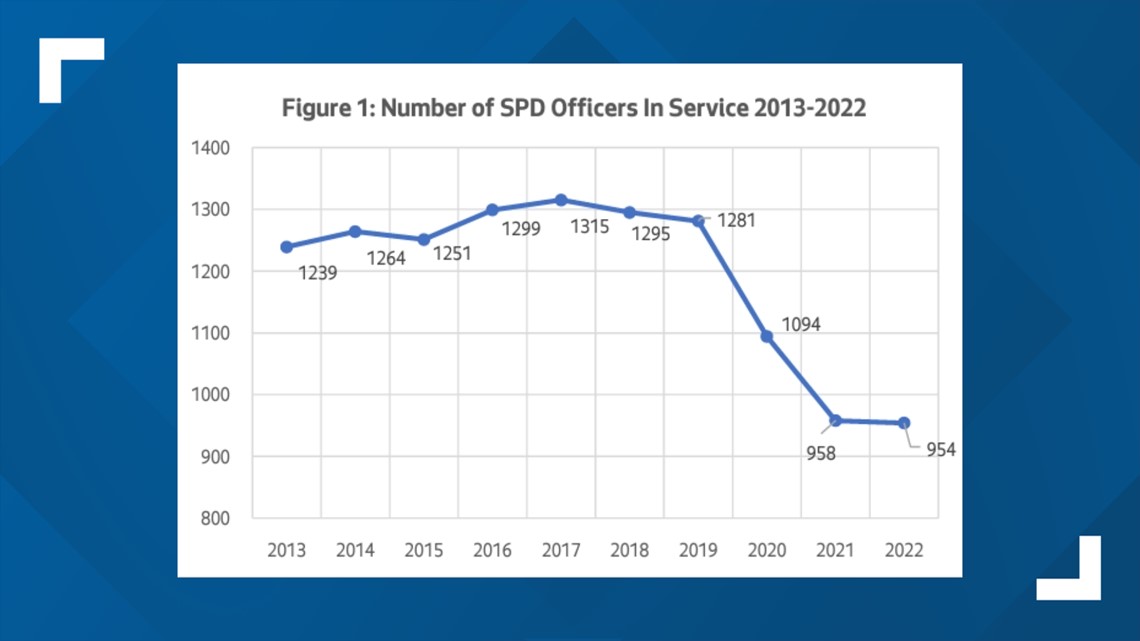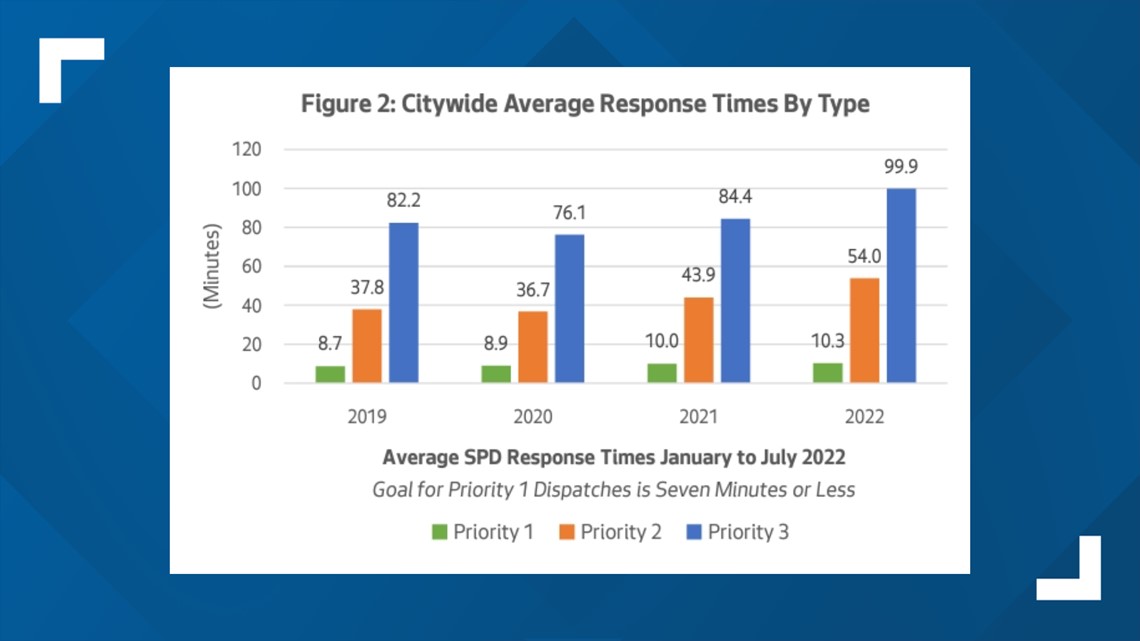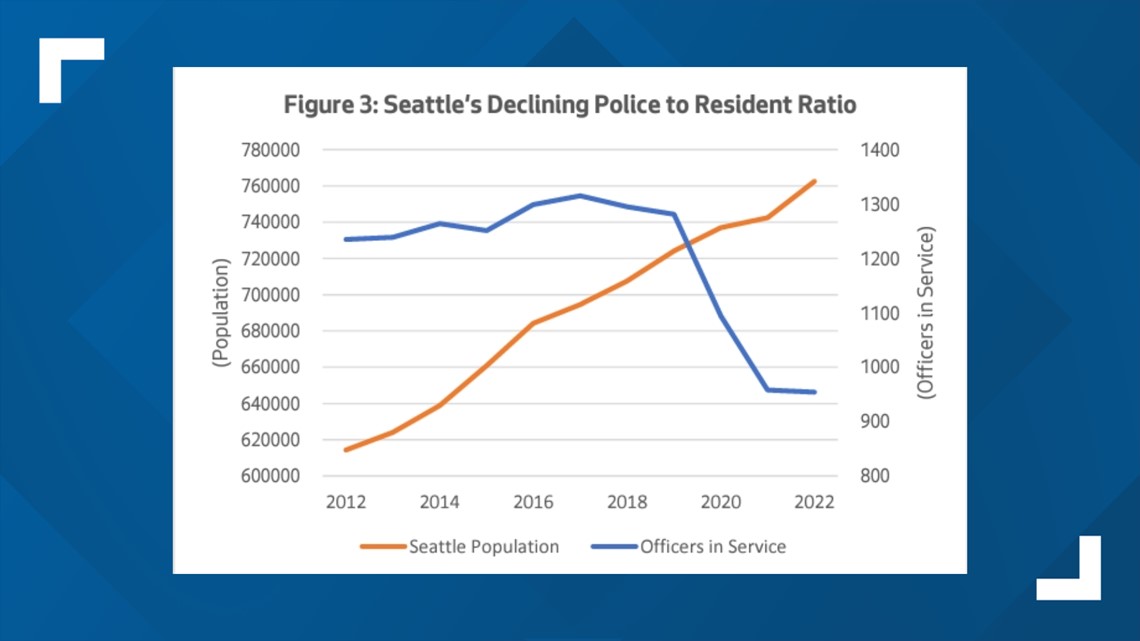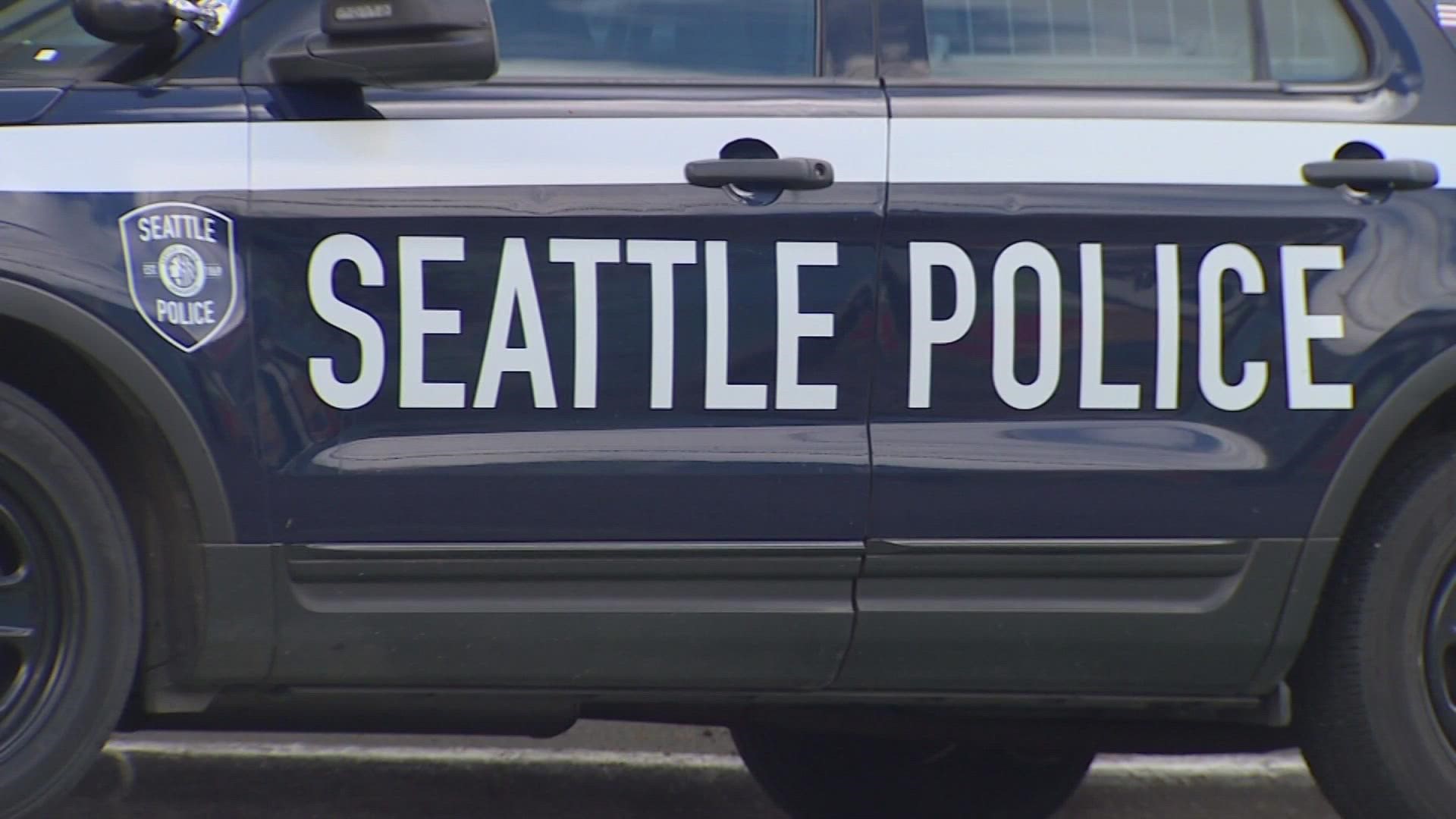SEATTLE — For the past couple of years, the Seattle Police Department (SPD) has been warning of a staffing crisis.
The department has resorted to offering hiring bonuses and moving expenses to help recruitment efforts.
In a new push for more officers, Seattle Mayor Bruce Harrell and Interim Police Chief Adrian Diaz announced a new recruitment strategy Tuesday that included increases in recruitment staffing and budget, competitive hiring incentives, relocation reimbursements, along with system efficiency and modernization improvements to accelerate the process for new recruits and lateral transfers.
Harrell said the recruiting strategy involves hiring incentives of up to $30,000 for lateral transfers and $7,500 for new recruits. Candidates applying for the SPD would be reimbursed for applicant fees, travel expenses and relocation costs when hired, according to the plan. Seattle City Council would need to approve the incentives for it to go into effect.
"We cannot deliver the effective public safety, swift response times, and thorough investigations our communities deserve without a well-staffed and well-trained police department,” Harrell said. “While today SPD staffing is at crisis levels, we also have in front of us an opportunity to restore and rebuild a Seattle Police Department that lives up to our highest values and priorities. We need the right number of officers and the right kind of officers."
The plan hopes to expand the pool of applicants by prioritizing officers who "reflect Seattle’s values and diverse communities and are committed to public service." Harrell said officers with diverse racial and immigration backgrounds, college education, language skills beyond English and people who value living in Seattle will be prioritized.
The city has hired additional staff dedicated to SPD recruitment as well, Harrell said.
Harrell's goal is for the department to reach 1,400 police officers. According to data from the city, Seattle had 1,315 officers in 2017, the highest total it has had in the last seven years.
The mayor called it a "realistic" goal, but he noted that he has to undo the reputational damage Seattle has incurred in the past three years.
“My job is to promote the goodness of Seattle," Harrell said. " That’s what I do. I will continue talking to officers, the people in the city. We are not going to give up. We are going to change the narrative and it starts with this plan. Changing the narrative is going to be critically important to our success.”
Safety and policing have been big points for the mayor during his tenure.
Over the past two-and-a-half years, the city of Seattle said over 400 police officers have left the department through retirement or resignation. The number of trained and deployable officers in 2022 is 954, the lowest mark in over 30 years. Seattle's population was almost half of what it is today.
The number of officers within the Seattle Department hovered between 1,200 and 1,300 for seven consecutive years before dropping to 1,094 in 2020, according to data from the city of Seattle.
The trend really began in the summer of 2020 with no concrete solution on how to change course.
New data released in April showed 43 sworn-in police staff left in 2022, while 13 have been hired, leaving the department with a net loss of 30 officers.
The trend is projected to continue. The data indicated the SPD expects to hire 98 more officers in 2022 and lose 113.


The declining number of officers, Harrell said, resulted in a 40% decrease in detectives available for "vital" investigative work and mounting overtime expenses.
Over the last three years, the citywide average response times have lagged as more officers left the department.
The city's goal is for priority one dispatches -- the most urgent type of calls - to be seven minutes or less. That mark was 8.7 minutes in 2019 when there were 1,315 Seattle police officers.
In 2022, the city's response time for priority 1 calls has jumped to 10.3 minutes.
SPD typically dispatches officers to lower priority calls, but now they are rarely sent to these calls for services because of the staffing crisis.


Diaz said Seattle needs to hire 500 more officers over the next five years to keep up with the city's population growth.
Seattle's population has steadily increased each year since 2012, mirrored by a steep drop in officers, according to data from the city.


But despite the staffing issues, Diaz said the department won't loosen its hiring requirements to fill vacancies.
"SPD won’t hire just anyone," Diaz said. "Despite our current staffing crisis, this is not a numbers game. Our mission is simply to help people, so we will hire only the most compassionate, dedicated, and qualified employees."
Diaz previously said the lack of staffing had caused a shift in how police do their jobs.
"Because we don't have as many specialty units, really kind of making every officer a generalist, so being able to be good at building relationships in the community, problem-solving and then also being able to have the skillset to handle an active shooter situation," Diaz said.
Diaz noted that 50% of hired recruits in 2022 were Black, Indigenous and people of color (BIPOC). He said 40% of hires in 2021 were a part of the BIPOC community.
Prioritizing diversity and equity is an important part of the hiring process, Diaz said.
Harrell said retaining and supporting current officers in the force is included in the wide-ranging plan.
The city is exploring new programs to support officer tuition assistance and hopes to create a pipeline of potential recruits through local colleges and universities.
"(Officers) have been demoralized and disrespected," Harrell said. "We are trying to get back to the basics in many ways."
The city of Seattle is currently in collective bargaining negotiations with the Seattle Police Officers Guild. The mayor said he is not afraid to go into arbitration for a new agreement, but he hopes there won't be prolonged negotiations.
An agreement with the Seattle Police Management Association was unanimously passed by the City Council last month.
Mayor Harrell's office submitted legislation Tuesday to the City Council to formalize his proposals that require action.
The proposal called for another $1 million to be invested in Seattle police recruitment, in addition to the $1 million already being used.
“We believe the council will be receptive," Harrell said.
In May, the Seattle City Council voted 6-3 to advance two measures related to police hiring incentives.
The council passed a resolution put forward by Councilmember Sara Nelson signaling support for funding a police staffing incentive program by lifting a budget proviso restricting the SPD from using salary savings.
The council also passed an ordinance by Councilmember Lisa Herbold authorizing the city to offer relocation assistance for recruits in several hard-to-fill positions with the city, including police officers.
The ordinance authorized $650,000 toward relocation benefits for police hires and an additional recruiter. Another $350,000 will be allocated to recruitment advertising and assisting with the search for the city's next police chief.
The vacancies have a trickle-down effect on specialty units.
Diaz said the department's Sexual Assault Unit is about half the size it was just a few years ago, with just five detectives handling all of the cases citywide.
A May 2 internal memo between top brass within the department provided by Seattle police states, "We currently have six positions not being actively filled due to absences and personnel shortages," in reference to the Sexual Assault Unit.
The department said it is causing the Sexual Assault Unit to triage more heavily than normal with cases where the suspect is in custody, as well as cases involving children and vulnerable adults taking priority.

